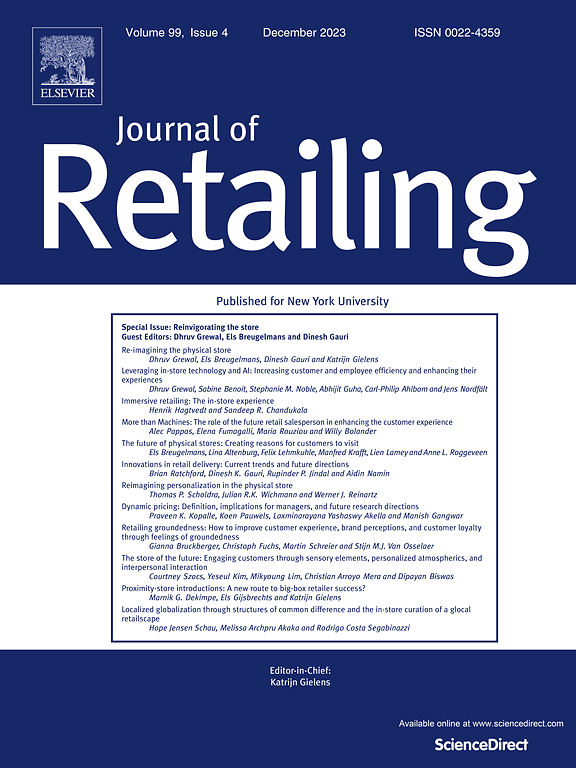Decoding consumer resistance to near-expired products: The role of social stereotyping
IF 10.2
1区 管理学
Q1 BUSINESS
引用次数: 0
Abstract
Why are consumers reluctant to purchase near-expired products despite the commonly tempting price deals associated with them? Whereas prior literature attributes this phenomenon to various product-related factors (e.g., freshness or quality concerns), we propose that it may also partially stem from consumers’ concern of being stereotyped as stingy; that is, people tend to stereotype the purchasers of near-expired products as stingy, which may in turn motivate consumers to resist these products to maintain their social evaluation. Seven studies—including an IAT (Implicit Association Test) experiment, a field experiment, lab and online experiments—offer converging evidence for the proposed effect. The authors also validate the proposed underlying process by showing that the effect is magnified when price discounts are applied to near-expired products and attenuates when purchases are made privately or when purchasers are imbued with socially desirable characteristics such as being proenvironmental and smart consumers. The authors conclude by highlighting insights for emerging ESG (Environmental, Social, and Governance) marketing and retailing practices.
解读消费者对即将过期产品的抗拒:社会刻板印象的作用
为什么消费者不愿意购买接近过期的产品,尽管与之相关的价格优惠通常很诱人?以往的文献将这一现象归因于各种与产品相关的因素(如对新鲜度或质量的担忧),而我们则提出,这一现象也可能部分源于消费者担心被定型为小气鬼;也就是说,人们倾向于将购买快过期产品的人定型为小气鬼,这反过来又可能促使消费者抵制这些产品,以维持他们的社会评价。七项研究--包括一项内隐联想测试(IAT)实验、一项现场实验、实验室实验和在线实验--为所提出的效应提供了一致的证据。作者还验证了所提出的基本过程,表明当价格折扣适用于接近过期的产品时,这种效应会被放大,而当私下购买或购买者被赋予了社会期望的特征(如环保和聪明的消费者)时,这种效应会减弱。最后,作者强调了对新兴 ESG(环境、社会和治理)营销和零售实践的启示。
本文章由计算机程序翻译,如有差异,请以英文原文为准。
求助全文
约1分钟内获得全文
求助全文
来源期刊

Journal of Retailing
BUSINESS-
CiteScore
15.90
自引率
6.00%
发文量
54
审稿时长
67 days
期刊介绍:
The focus of The Journal of Retailing is to advance knowledge and its practical application in the field of retailing. This includes various aspects such as retail management, evolution, and current theories. The journal covers both products and services in retail, supply chains and distribution channels that serve retailers, relationships between retailers and supply chain members, and direct marketing as well as emerging electronic markets for households. Articles published in the journal may take an economic or behavioral approach, but all are based on rigorous analysis and a deep understanding of relevant theories and existing literature. Empirical research follows the scientific method, employing modern sampling procedures and statistical analysis.
 求助内容:
求助内容: 应助结果提醒方式:
应助结果提醒方式:


